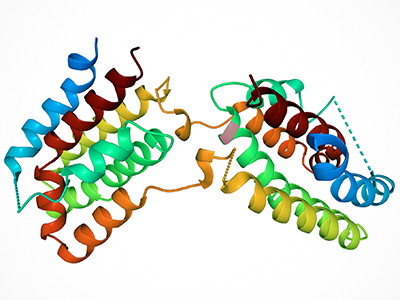
Researchers have discovered a new targeted therapy that could have long-lasting effectiveness and few side effects.
A small molecule that packs a big anti-inflammation activation punch may provide relief to the millions of individuals around the world who suffer from ulcerative colitis and other inflammation-related diseases, according to the findings of a new study published in iScience.
“Our research shows for the first time that the beneficial anti-inflammatory action of the Interleukin-10 (IL-10) protein occurs through activation of SHIP1, and that a small molecule activator can mimic the beneficial effects of IL-10,” says study lead and Vancouver Coastal Health Research Institute (VCHRI) scientist Dr. Alice Mui.
“By activating SHIP1, we believe that this small molecule will be able to inhibit the inflammation in specific models of colitis.”

In healthy individuals, IL-10 activates the inositol polyphosphate-5-phosphatase SHIP1 (SHIP1) enzyme, which suppresses inflammatory responses that can lead to colitis. When IL-10 or the SHIP1-activating receptor is absent, the inflammatory response forges ahead unchecked.
An untreated lack of SHIP1 activation can lead to inflammatory bowel diseases, such as ulcerative colitis—inflammation and sores that occur in the digestive tract—asthma, skin rashes and arthritis, among other inflammatory conditions.
“Colitis is often an initial sign that a person’s IL-10 system is not working correctly.”
Mui first discovered the important anti-inflammatory role of SHIP1, then known simply as SHIP, in 2006. However, her most recent study on the topic identifies the key role SHIP1 activation plays in suppressing colitis. Using a small molecule, called ZPR-MN100, Mui and her team were able to activate SHIP1 and halt colitis symptoms.
The small molecule used in Mui’s research is only a few hundred daltons in size—a dalton is an infinitesimally microscopic unit measuring just 1.660 538 86 × 10⁻²⁷ kilogram.
“This small molecule is able to cross the cell membrane, bind to and activate SHIP1,” explains Mui. “In a clinical setting, this molecule could be developed into an oral medication for use in the treatment of conditions such as colitis.”
A therapy that could have lasting colitis-inhibiting effects
There is presently no cure for colitis, and no effective long-term treatment. The most commonly used therapy, TNF inhibitors, is typically only effective for a period of time among some patients, explains Mui. Then it eventually stops working. Steroids are also prescribed to manage flare-ups, but these “broad sledgehammers” inhibit all immune cells, and often come with unwanted side effects.
“Colitis exerts a huge burden on people with the disease. It prevents them from working, reduces their ability to absorb nutrients and gives them chronic pain and diarrhea.”
Elevated levels of inflammation caused by colitis can also increase people’s risk of developing cancer. A novel treatment could not only spare patients from the acute symptoms of the condition, but also the long-term associated health risks.
“Our small molecule is a completely different approach to treating colitis,” says Mui. “It could be delivered directly to the colon—minimizing side effects—to elicit a key natural mechanism that the body uses to inhibit colitis.”

“In addition to providing an effective long-term treatment option, this is a therapy that could be taken by patients at home, reducing their need for specialty therapy, colonoscopies and other invasive procedures.”
“We are very hopeful that this could bring relief to most colitis patients and dramatically improve their quality of life.”


